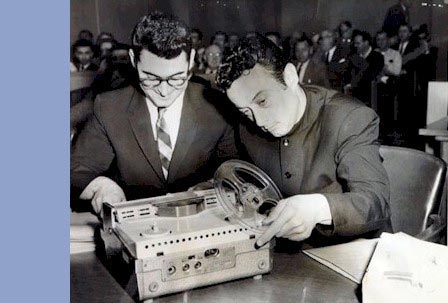The following excerpt from the
New York trial transcript may assist the listener:
Richard
Kuh:
You spoke of the “pissing in the sink” incident as a urinary phenomenon—I
believe I quote you accurately—
Richard
Gilman:
Not—
Kuh:
Not a urinary phenomenon—but a sociological and psychological
phenomenon. Do I quote you correctly?
Gilman:
Yes
Kuh:
And then you continued, I believe, saying this sociological and
psychological phenomenon, that Bruce was referring to bad housing. Is that
correct? . . . The lack of bathrooms.
Gilman:
No, that isn’t correct. I added that as a . . . as a possibility.
Kuh:
You did add that as a possibility?
Gilman:
Yes, I made no—
Kuh:
Are you certain?
Gilman:
I cannot be certain of anything that he says—
Kuh:
Then there is some obscurity about what Bruce says, and does.
Gilman:
I would hope there would be, because if the outcome were certain, if we
knew it, it would be a mathematical demonstration—
Kuh:
And in terms of an oral performance, is obscurity part of oratory?
Gilman:
Uh, stated that way, obviously not. Obscurity may be necessary for the
nature of the material or the work.
Kuh:
Would you say the great words in oral performances that have lived through
generations—“Give me liberty or give me death,” “The only thing we have to
fear is fear itself”—words like this were obscure? Is that part of their
glory and their merit?
[At this
point, lead defense counsel Ephraim London objects to the line of
questioning, but the objection is overruled.]
Gilman:
The analogy is invalid. You’re talking about political oratory. And this
is a performer in a nightclub, an imaginative worker, not a speechmaker.
Kuh:
I am talking about clarity in an oral performance that the audience has no
opportunity to get any way except strictly orally. And I'm asking you,
will you tell me whether the “pissing in the sink” incident is so obscure
that you don't know what he was talking about?
Gilman:
I said nothing of the kind.
Kuh:
What was he talking about?
Gilman:
I said nothing of the kind.
Kuh:
When you said “sociological and psychological phenomenon,” and then
parenthetically said “bad housing,” what were you talking about?
Ephraim
London:
Your honor, please, we've had three questions and the witness hasn't been
given the opportunity to answer any of them.

